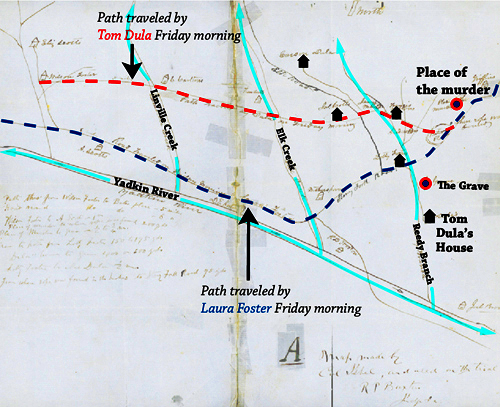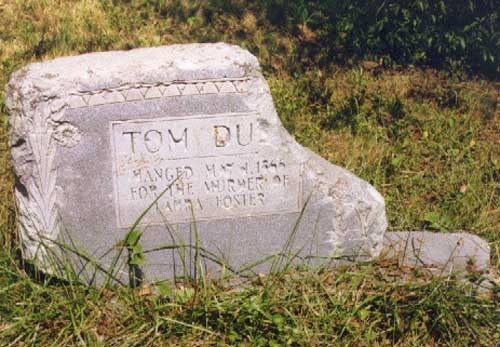Dula, Thomas C. ("Tom Dooley")
20 June 1844–1 May 1868
 Thomas C. ("Tom Dooley") Dula, Confederate war veteran, convicted murderer, and folk subject, was born in Wilkes County, the son of Mary Dula. On 15 Mar. 1862 he enlisted in the Confederate Army as a private, serving in Company K, Forty-second Regiment, North Carolina Infantry. He remained a private until March 1864, when he was rated as "Drummer." Dula was hospitalized at Episcopal Church Hospital, Williamsburg, Va., on 10 Aug. 1864. He was captured at Kinston and was a prisoner of war at Point Lookout, Md., where he was released after signing the oath of allegiance on 11 June 1865.
Thomas C. ("Tom Dooley") Dula, Confederate war veteran, convicted murderer, and folk subject, was born in Wilkes County, the son of Mary Dula. On 15 Mar. 1862 he enlisted in the Confederate Army as a private, serving in Company K, Forty-second Regiment, North Carolina Infantry. He remained a private until March 1864, when he was rated as "Drummer." Dula was hospitalized at Episcopal Church Hospital, Williamsburg, Va., on 10 Aug. 1864. He was captured at Kinston and was a prisoner of war at Point Lookout, Md., where he was released after signing the oath of allegiance on 11 June 1865.
Dula returned to Wilkes County and resumed a liaison with Ann Melton, wife of James Melton, which had begun when Dula was fifteen. Early in 1866 he began to cohabit with Laura Foster, from whom he eventually contracted syphilis which he then transmitted to Ann Melton.
On the morning of 25 May 1866, Laura Foster was seen on Stony Fork Road riding her father's mare with a bundle of clothing in her lap and headed toward the Bates Place, a lovers' rendezvous. The next morning, the mare returned to the Foster home with a broken rope dangling from its halter. A search for the missing Laura began immediately; on 18 June her body was found in a shallow grave near the Bates Place. Death was the result of a stab wound, and it was reported that she was pregnant at the time of death. The next day, Dula fled to Watauga County and then to Tennessee. He was captured and returned to Wilkes County about three weeks later.
 Dula and Ann Melton were brought to trial for the murder of Laura Foster in the Fall Term, Wilkes County Superior Court; the trial was moved to Iredell County, where the cases of the defendants were severed. Dula was convicted, but the North Carolina Supreme Court reversed the conviction and returned the case to Iredell County. After several postponements, Dula was tried by a Court of Oyer and Terminer in January 1868 and was again convicted. After the decision was sustained by the supreme court, he was hung in Statesville on 1 May 1868.
Dula and Ann Melton were brought to trial for the murder of Laura Foster in the Fall Term, Wilkes County Superior Court; the trial was moved to Iredell County, where the cases of the defendants were severed. Dula was convicted, but the North Carolina Supreme Court reversed the conviction and returned the case to Iredell County. After several postponements, Dula was tried by a Court of Oyer and Terminer in January 1868 and was again convicted. After the decision was sustained by the supreme court, he was hung in Statesville on 1 May 1868.
Even before Dula's execution, a ballad about him and Laura Foster was being sung in Wilkes and Watauga counties to the tune of "Run, Nigger, Run, the Patter Roller's After You":
Hang down your head, Tom Dula
Hang down your head and cry;
You killed poor Laura Foster
And now you're bound to die.
Educator Resources:
Hang Down your Head Lesson Plan, State Archives of North Carolina
References:
Henry M. Belden and Arthur Palmer Hudson, eds., The Frank C. Brown Collection of North Carolina Folklore, vol. 2 (1952).
Compiled Service Records of Confederate Soldiers Who Served from Organizations from the State of North Carolina (North Carolina State Archives, Raleigh).
Original case records, North Carolina Supreme Court (North Carolina State Archives, Raleigh).
John Foster West, The Ballad of Tom Dula (1971).
Additional Resources:
"Insight: the Tom Dooley Story." 1966. Thomas Dula Collection, State Archives of North Carolina. (Publication includes lyrics of a popular song about Dula.) Online at https://digital.ncdcr.gov/Documents/Detail/insight-the-tom-dooley-story/746389
"Iredell County criminal action papers: Tom Dula case." 1866-68. Thomas Dula Collection, State Archives of North Carolina. Online at https://digital.ncdcr.gov/Documents/Detail/iredell-county-criminal-action-papers-tom-dula-case/746391
"Wilkes County criminal action papers: Tom Dula case." 1866-68. Thomas Dula Collection, State Archives of North Carolina. Online at: https://digital.ncdcr.gov/Documents/Detail/wilkes-county-criminal-action-papers-tom-dula-case/746556
"Wilkes County, Minute Docket Superior Court: Tom Dula Case." 1868. Thomas Dula Collection, State Archives of North Carolina. Online at: https://digital.ncdcr.gov/Documents/Detail/wilkes-county-minute-docket-superior-court-tom-dula-case/746560
North Carolina Supreme Court. 1867. "Supreme Court Case Number 8922." Thomas Dula Collection, State Archives of North Carolina. Online at https://digital.ncdcr.gov/Documents/Detail/supreme-court-case-8922-state-v.-tom-dula/746514
North Carolina Supreme Court. 1868. "Supreme Court Case Number 8923." Thomas Dula Collection, State Archives of North Carolina. Online at https://digital.ncdcr.gov/Documents/Detail/supreme-court-case-8923-state-v.-tom-dula/746521
Story of Tom Dooley, NC Visitor's Center: http://ncvisitorcenter.com/Story_of_Tom_Dooley.html
Western North Carolina Historical Association article on Tom Dula: http://www.wnchistory.org/educationalprograms_43_2870099493.pdf
Image Credits:
Paths walked by Tom Dula and Ann Melton, drawn over the original map drawn by Col. Isabel in the trial of Tom Dula. Courtesy of State Archives of NC. Available from http://exhibits.archives.ncdcr.gov/educationalresources/tomdula.html (accessed January 28, 2013).
"Thomas C. Dula 1844-1868." N.C. Highway Historical Marker M-48, N.C. Office of Archives & History. https://www.ncdcr.gov/about/history/division-historical-resources/nc-highway-historical-marker-program/Markers.aspx?sp=Markers&k=Markers&sv=M-48 (accessed January 28, 2013).
1 January 1986 | Mitchell, Thornton W.